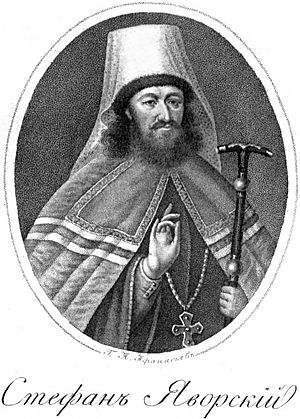Stefan Yavorsky facts for kids
Quick facts for kids |
|
|---|---|
| Metropolitan and archbishop of Moscow | |
 |
|
| Church | Russian Orthodox Church |
| See | Moscow |
| Enthroned | 1721 |
| Reign ended | 1722 |
| Predecessor | Patriarch Adrian of Moscow |
| Successor | Theophan Prokopovich |
| Personal details | |
| Born | 1658 |
| Died | 8 December 1722 |
Stefan Yavorsky (Russian: Стефа́н Яво́рский, Ukrainian: Стефа́н Яво́рський), born Simeon Ivanovich Yavorsky (Russian: Симеон Иванович Яворский), was an important church leader and government official in the Russian Empire. He lived from 1658 to 1722. He became the first president of the Most Holy Synod, which was the highest governing body of the Russian Orthodox Church.
Contents
Stefan Yavorsky's Early Life and Studies
Stefan Yavorsky was born in a town called Yavoriv, near Lviv, in what is now Ukraine. Around 1673, he started studying at the National University of Kyiv-Mohyla Academy. This was a famous school at the time.
In 1684, he traveled to Poland to continue his education. At that time, many students from Kyiv who wanted to study in the Polish-Lithuanian Commonwealth (a large country that included Poland and Lithuania) had to join the Uniate church. This church was connected to the Roman Catholic Church but kept some Eastern traditions. Stefan Yavorsky joined this church and took the name Stanislav.
He spent five years studying abroad. He learned about philosophy (the study of knowledge and existence) in Lviv and Lublin. He also studied theology (the study of religious faith) in Poznań and Vilnius.
Returning to Orthodoxy and Rising in the Church
In 1689, Stefan Yavorsky returned to Kyiv. He decided to leave the Uniate church and rejoin the Eastern Orthodox Church. He became a monk and took the name Stefan. He then worked at the Kyiv Academy as a preacher and professor.
By 1697, he became the head, or hegumen, of the Nikolaevsky monastery. He was also known for his powerful sermons, which made him very popular in Kyiv.
In early 1700, Stefan Yavorsky visited Moscow for church matters. When a powerful noble, Aleksei Shein, died, Patriarch Adrian asked Yavorsky to give the speech at the funeral. This speech impressed Tsar Peter the Great very much. Peter wanted Yavorsky to stay in Moscow. Soon after, in April, Yavorsky was made the archbishop of Ryazan and Murom.
Later that year, in October, Patriarch Adrian died. Stefan Yavorsky was then chosen to lead the church temporarily. This was a huge step up for him in a very short time. He became the head of the entire church in just seven months.
Challenges as Church Leader
Stefan Yavorsky's life changed a lot after he became the temporary head of the church. He lived mainly in Moscow and Saint Petersburg, only rarely visiting Ukraine. As the church leader, he faced many challenges. He had to deal with different groups within the church. He was also expected to support Tsar Peter the Great's many reforms.
At first, he supported Peter's changes. However, as the reforms started to limit the church's power, Yavorsky began to disagree with them. In 1712, he gave a sermon that seemed to criticize the Tsar. He called Peter's son, Tsarevich Alexei, "Russia's only hope." This made Peter the Great very angry, and he banned Yavorsky from preaching in public.
Yavorsky also worked on correcting the translation of the Bible. He wrote a large book called The Rock of Faith (Russian: Камень веры). This book strongly argued against Protestant ideas. Tsar Peter did not allow it to be published during Yavorsky's lifetime. It was finally published in 1728, after both Peter and Yavorsky had died.
In 1721, Stefan Yavorsky became the first president of the new Holy Synod. This new body replaced the role of the Patriarch and was meant to give the Tsar more control over the church. However, the real power in the Synod was held by Theophan Prokopovich, who was a close friend of Peter the Great.
Stefan Yavorsky died in 1722. Just before his death, he was questioned by members of the Synod and the Senate. He was suspected of being involved in a publication that called Peter the Great the Antichrist. Some believe that his death might have saved him from punishment.
Stefan Yavorsky's Writings
Stefan Yavorsky was one of the most educated people in the Russian church during his time. He always preferred a quiet life focused on writing.
Around 1685, he published a work called Hercules post Atlantem. It was a complex piece of writing with Latin prose and poems in Latin and Polish. In 1690, he published two more works praising another church leader, Varlaam Yasinsky. These works, Arctos coeli and Pełnia nieubywającej chwały, helped him become known as a poet.
After he became the head of the Nikolaevsky monastery, his sermon Vinograd Khristov (The vineyard of Christ) was published in 1698. Later, he wrote a refutation (a statement proving something is false) against a man named Grigory Talitsky, who claimed Peter the Great was the Antichrist. Yavorsky's refutation, Znameniya prishestviya Antikhristova i konchiny veka (Signs of the arrival of the Antichrist and the end of the age), was published in 1703 and was reprinted many times.
Images for kids
 | Bayard Rustin |
 | Jeannette Carter |
 | Jeremiah A. Brown |


